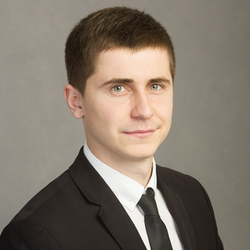Kirill Kabanov, Council for Human Rights: “Our functionaries already start to take bribes in bitcoins!”
How the new law obliges the Central Bank to help prosecutors to look for public workers’ foreign accounts while they use subterfuge
The next “anti-corruption” law came into force in Russia. It, in authorities’ opinion, is to improve the efficiency of the fight against dishonest functionaries. According to the new amendments, the Prosecutor General’s Office has now the right to request information about public workers’ foreign accounts from either the Central Bank — thus Elvira Nabiullina’s agency is forced to violate banking secrecy — or competent bodies in foreign countries. In case such accounts are found, deputies will be divested of mandates, while functionaries will be fired “due to a loss of confidence”. However, Realnoe Vremya’s experts are quite sceptical about the prospects of the new anti-corruption law having said about functionaries’ evasion of the prosecutor’s supervision. Fake divorce, bribes in bitcoins and opening of foreign accounts in the name of affiliated people, which can’t be controlled, are the most popular subterfuges of popular servants. Meanwhile, despite all the anti-corruption amendments, Russia is at the tail end of the international corruption rankings.
Why was the Central Bank asked to cooperate with prosecutors?
The next law, which, in people's representatives’ opinion, is to “increase the efficiency of the fight against corruption” came into force on Tuesday, 6 August 2019. Initiated by Russian President Vladimir Putin as early as October 2018, it unusually fast went through the first, second and third reading in the Russian State Duma (in December 2018 and January 2019), the law was already approved by the Federation Council by late January.
The goal of the law is to, first of all, simplify the work of the Prosecutor General’s Office in search of functionaries, deputies’ foreign accounts. According to the document, now the Prosecutor General’s Office of the Russian Federation can request information about Russian functionaries’ deposits, accounts, cash, assets and foreign financial tools from foreign banks abroad on its own or through the Central Bank of the Russian Federation. The regulator, in turn, will be able to turn to foreign central banks with a request to provide information and then hand it over to the Prosecutor General’s Office of the Russian Federation.
As it is said in the explanatory note to the bill, the amendments created by the State Duma’s Committee on Security and Corruption Control together with the Committee on Financial Market, were needed to carry out the Federal Law on Prohibition of Certain Groups of Persons from Opening and Maintaining Accounts (Deposits), Depositing Cash and Valuables in Banks Located Outside the Russian Federation, and Owning and/or Operating Foreign Financial Instruments as of 7 May 2013.
What will a public worker face if his account is found in a Swiss bank?
Bans on owning foreign accounts and deposits in foreign banks have been in force in the country since 2013, which refers to people who substitute public posts of the Russian Federation, public posts of regions of the Russian Federation, all-level deputies, heads of the Central Bank of the Russian Federation, heads of urban districts, heads of municipal districts, heads of other municipal institutions fulfilling responsibilities of heads of local governments and others.
The State Duma thinks that “after the law came into force, a clear, efficient mechanism to control how functionaries meet anti-corruption requirements and bans, which minimises the possibility of functionaries violating the ban to have deposits or accounts abroad appeared”. According to existing legislation, Chairman of the specialised Committee on Security and Corruption Control Vasily Piskaryov noted, for concealment of an account found in a foreign bank the violator can be fired because of a loss of confidence, while deputies lose authority.
CB was almost forced to violate banking privacy
The regulator didn’t have the right to breach banking secrecy until recently, the amendments made an exception for information about functionaries’ foreign accounts. The Prosecutor General’s Office also got the authority to cooperate with competent agencies in foreign countries when examining “suspicious” accounts. The examinations themselves will obviously get complicated by the sanction war with same Europe.
It should be reminded that though the ban on foreign accounts for foreigners was imposed in 2013, it wasn’t illustrated in the law on corruption control where reasons for which a functionary can be fired are enumerated. In the project of amendments in 2017, which was created by the Parliament of Mordovia, by the way, it was offered to write additions why a functionary could be ousted for having accounts in foreign banks and use of foreign financial tools. Allegedly, this was to simplify the dismissal of functionaries because of a “loss of confidence”.
Despite amendments: Russia is at the tail end of the corruption rankings
At the same time, functionaries can be fired if they don’t provide information not only about their profit but also costs. Despite all the amendments, in 2018 Russia ranked 138th in the Corruption Perceptions Index by Transparency International — in line with Iran, Lebanon, Mexico and Papua New Guinea. Russia scored just 28 out of 100 possible points. While the Russian Federation scored 29 in 2015-2017. Transparency International Russia claimed: “Russia has problems of corruption because the current institutions of a democratic society are often imitated”.
Realnoe Vremya’s experts in general didn’t welcome the new law with concern considering it rather “a logical necessity” and “technology issue”. Though Andrey Naberezhny, head of projects of the Moscow College of Advocates Yakovlev and Partners, for instance, didn’t exclude that the new law would allow revealing these or other accounts, it would be impossible to solve the problem of corruption completely, he thinks.

“Nowadays it is impossible to stop the opening of accounts in the name of affiliated people”
Famous Russian economic Nikita Krichevsky agrees with him, too. He noted that today all this information about foreign accounts isn’t a secret. It is available: the same Federal Financial Monitoring Service of the Russian Federation, FSB can easily get information about accounts. He considers the new bill itself to be rather a “specification of limits”, the economist doesn’t see any breakthrough or innovation. Can it help to fight corruption in Russia?

“Our functionaries already start to take bribes precisely in bitcoins!”
Though head of the public organisation National Anti-Corruption Committee (part of the National Anti-Corruption Council of the Russian Federation) Kirill Kabanov agrees that the new amendments were caused by a technological and logical necessity “because if today the prosecutor’s office examines and can’t request information, many things become meaningless”, he was more optimistic about anti-corruption prospects of the law. In his opinion, today anti-corruption legislation in Russia “is carried out quite fast and effectively”. And relatives won’t help functionaries, Kirill Kabayev believes, because if agencies launch an investigation, they examine a functionary’s inner circle in the end. However, he thinks that another corruption problem arises in front of controlling bodies in the fight against corruption — bitcoins.
“Our functionaries already start to take bribes precisely in bitcoins! And today, unfortunately, it is hard to detect, document it all. I don’t know why Sberbank still tries to lobby these bitcoins. Today there are people in Russia who are interested in such closed transactions. And the same Prosecutor General’s Office must control them,” he said in a talk with Realnoe Vremya.